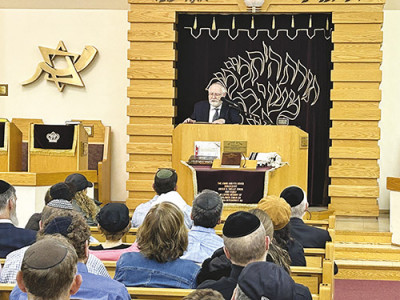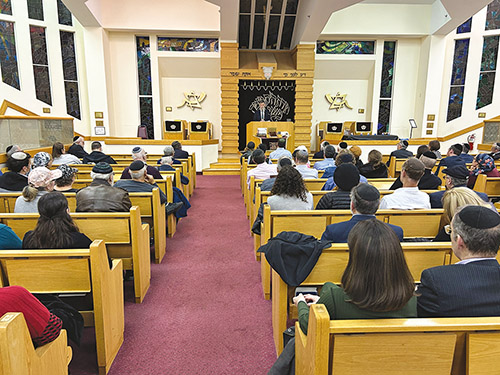
It’s not often you see a nearly full house in the main sanctuary of a large shul on a weekday night. But that was the scene on Tuesday, April 18, when many dozens of Highland Park/Edison community members gathered at Congregation Ohr Torah (OT) in Edison to participate in a Yom HaShoah program featuring Rabbi Hanoch Teller and to remember the 6 million Jews who perished in the Holocaust.
The event, organized by Dr. Marc Hanfling and Dr. Neer Even-Hen, featured prolific author and speaker Rabbi Teller. The rabbi, a Holocaust scholar and sought-after Yad Vashem docent, told stories from his book “Heroic Children: Untold Stories of the Unconquerable,” which chronicles the lives and experiences of nine children who survived the Holocaust.
Dr. Even-Hen started the event by introducing the rabbi of OT, Rabbi Yaakov Luban, who lamented that the number 6 million “camouflages the fact that they were individuals,” noting that the loss of each person was the loss of a whole world. Rabbi Luban spoke of the importance of remembering the people who died and remembering the cruelty of the Nazis, which he described as “beyond human comprehension.”
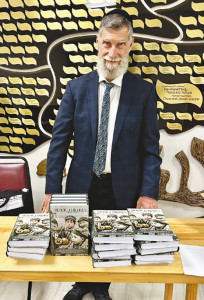
Rabbi Dr. Bernard Rosenberg, chairman of the Holocaust Commission of the New York Board of Rabbis, spoke about growing up as the child of Holocaust survivors. He encouraged those in attendance to continue to search for family members. “There are people still out there that are your relatives,” he said, and urged everyone to join together to fight against antisemitism.
Before introducing Rabbi Teller, Dr. Hanfling of Edison, himself a child of a Holocaust survivor, emphasized the importance of perpetuating the memory of those who perished and those who survived. “There aren’t many survivors who are still around,” he said. “It’s up to us to make sure that the memories of the kedoshim live on. It’s important to remember the events during and after the Holocaust to ensure it never happens again.”
Rabbi Teller stated that making a program like this is a significant way to remember those who perished. “If we look at the Holocaust as a dead story, a story of our great-grandparents, our grandparents, possibly our parents, then there is nothing that we can learn regarding the future.” By talking about the lives of individuals, he sought to bring their stories to life.
To illustrate this point, Rabbi Teller shared a story about the Baal Shem Tov. The tzadik had the practice of walking to a particular spot in the forest where he would say a personal prayer, and a malach would appear to him. When the Baal Shem Tov passed away on the first day of Shavuot in 1760, his talmidim knew the place where he prayed but had trouble remembering the prayer. Students in the next generation could not locate the right spot in the forest to pray. And students in the next generation could not recall which forest to visit! Our job, suggested Rabbi Teller, is to keep the forest and the idea of the prayer in mind.
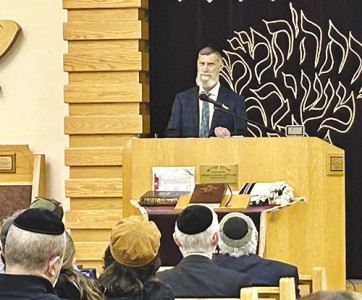
Rabbi Teller said that when he was young, he often saw survivors with the concentration camp numbers tattooed on their arms. He wonders now how often his children see the tattooed numbers, and wonders even more if his grandchildren have ever seen these numbers at all.
Great rabbonim of the previous generation, such as Rav Moshe Feinstein, viewed Holocaust survivors as possessing a unique type of kedusha that deserved the greatest level of respect, Rabbi Teller said. He described the behind-the-scenes struggles by Rav Aharon Cutler and others during World War II to rescue Jews in Germany and how, tragically, U.S. political leaders and certain prominent Jewish leaders did not support these efforts.
Rabbi Teller also spoke out against the myth that the Jews of the Holocaust “went like sheep to the slaughter,” pointing out that the Nazis exercised tremendous cruelty. Jews in the camps knew that if they were on a 10-person work detail and one person escaped, the other nine would be executed. And they also knew that it was very unlikely that anyone in the surrounding town would offer an escaped Jew a refuge.
Rabbi Teller shared examples of the Nazis’ efforts to confuse and manipulate Jews, such as having music performed as they entered concentration camps and then forcing them to write postcards to relatives in other countries, saying how good their conditions were in Germany, before forcing them into the gas chambers.
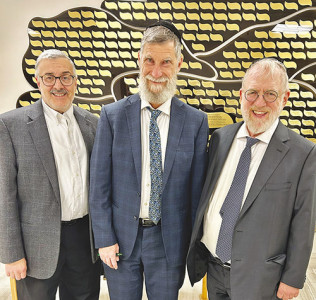
After the renowned author and lecturer finished his talk, Edison Mayor Sam Joshi expressed the importance of understanding and recognizing the diverse backgrounds of those within the greater Edison/Highland Park community and respecting their differences. He urged everyone to “push back against hate.”
Ira and Ellen Smith of Edison described the evening as fascinating and inspiring. “He made it very personal by talking about the story behind the cover of his book,” said Ira Smith, referring to Rabbi Teller’s effort to identify the boy in the picture on his book cover. “It makes me want to read his books,” said Ellen Smith.
“My mother was a ‘Names, Not Numbers’ participant,” said Penny Kaplan. “I’m sure she would agree with his message of standing up for each other.”
The evening concluded with the Kel Maale Rachamim prayer and “Hatikvah,” sung by Avi Siegel.
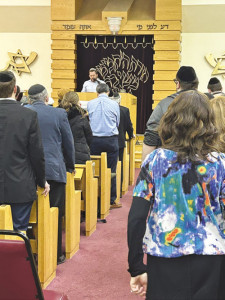
Reached before the event, Ohr Torah’s Assistant Rabbi Sariel Malitzky stated: “Rabbi Hanoch Teller is one of the official guides at Yad Vashem in Yerushalayim and was the personal guide to the Hanflings, one of our esteemed members, on their recent visit there. Dr. Marc Hanfling suggested that he would be an impactful speaker for our annual Yom HaShoah event. We are grateful to have such a prolific author, speaker and Holocaust historian as the speaker for the annual Edison/Highland Park Yom HaShoah program.”
Gavriella Dietz is an eighth-grade student at Bruriah in Elizabeth. She is an aspiring writer who is delighted to see her work published in The Jewish Link.
Harry Glazer was proud to work with her on this news story.
